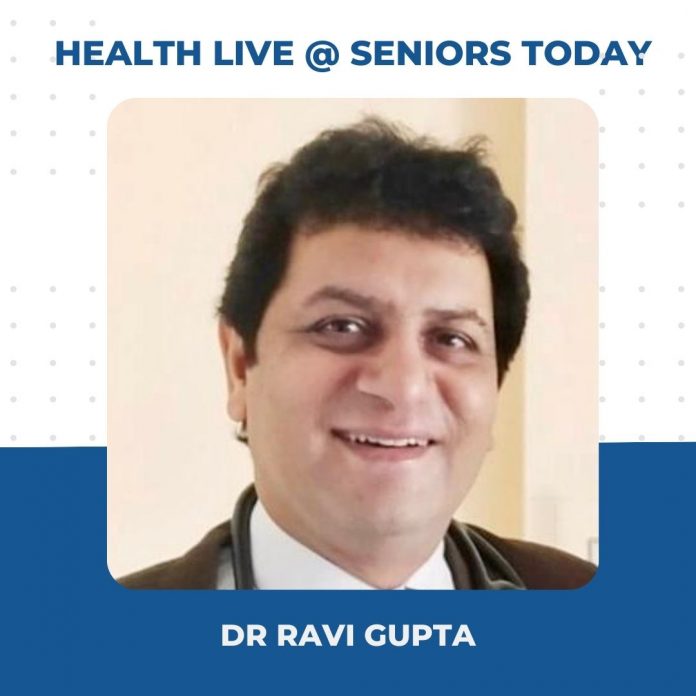On August 21, 2021, Seniors Today hosted its weekly Health Live Webinar. This week’s session was on Cardiac Care for Senior Citizens with Dr Ravi Gupta.
Dr Ravi Gupta is a leading cardiologist with around 32 years as a medical practitioner. He has been practicing invasive and non-invasive cardiology and is attached to the Wockhardt Hospital in South Central Mumbai. He is a Fellow of American College of Cardiology as well as Fellow of Society of Cardiovascular Angiography and Interventions. He has done more than 6000 coronary angioplasties including complex cases like left main, bifurcation lesions and chronic total occlusions. Dr Gupta is also a nationally acclaimed artist and has written a book on medical humour called ‘Mad Scene’ in 2005.
– The normal heart rate is between 60-100 bpm (beats per minute). But if a patient’s heart rate is between 50-60 and he/ she has no symptoms, in that case, Dr Ravi says that it is not abnormal or worrying either.
- Sinus bradycardia is when the pulse starts from the pacemaker, which is called the SA node, travels through the right channel but is slow right from the beginning. In this case, if the patient has no other symptoms accompanying the slow heart rate, no intervention is required.
- But if the patient has a slow heart rate with symptoms such as giddiness, syncope, in these cases we need to intervene and look for the cause.
- Some individuals who are into athletic sports and do excessive physical activity, in such individuals too, the heart rate becomes slow.
– The heart is supposed to pump 6L blood into the body every minute, this is called the cardiac output. It can do this by either pumping faster but with a lesser amount of blood or it can do so by pumping slowly but in larger volume. This is why trained athletes can pump the same amount of blood even with slower heart beats.
– After an angioplasty, we cannot really tell with absolute certainty if the rate at which the heart is pumping blood will improve or not; all of that depends on the cause for which the patient was taken up for angioplasty. If it was for a heart attack, there is a very high chance that the EF (Ejection Fraction) will improve once the angioplasty has been done for the occluded artery, since in that case, we know with certainty that the occlusion is recent.
– If an individual has had a low ejection fraction for a long time, it also means that the occlusions have stayed for long and so the amount of time it might take to improve or the degree of improvement cannot be predicted and varies from person to person.
Missed beat is when a heart beat is generated from the pacemaker but the impulse is not strong enough to be perceived in the radial pulse (on the wrist). This missed beat can be reflection of an electrolyte imbalance, for example an imbalance in the levels of sodium or potassium, if an individual has a blockage or occlusion, it may be a manifestation of ischemia. It is not a benign condition and can become a life threatening one too if these premature beats or missed beats come consecutively. If we have 3 or more missed beats, it is called ventricular tachycardia which can be a life threatening situation.
Anyone who has a missed beat in the ECG, basic investigations such as serum electrolytes, 2-D echo and TMT- Echo should be done.
The corona virus has affected everybody, some by invading their bodies others by just its presence. Hence, if you’re someone who has recovered from covid 19 and are experiencing palpitations, it can be because of anxiety. The second reason can be that you’ve been experiencing palpitations and a fast heart rate because of the virus’s effect on the autonomic nervous system. The autonomic nervous system is responsible for controlling our heart rate and blood pressure.
You can tell whether it is due to the effect on the autonomic nervous system by seeing if your heart rate goes up after changing your position; for example, if it increases while going from lying to sitting position or from sitting to standing, it is probably due to the autonomic nervous system. If your heart rate stays the same at all times then it can be because of anxiety.
In either case, the patient can take Propanolol which will take care of the anxiety and the autonomic nervous system.
– Some ways to increase your good cholesterol:-
- Regular walk and exercise. Dr Ravi has a simple rule of 4- if you can walk 4kms in 40 minutes, 4 days in a week then you do not need to do anything/ else. It will take care of your cholesterol, blood pressure, and many other comorbidities.
- Atorvastatin is the best drug for cholesterol control in Dr Ravi’s opinion
- Moderate alcohol consumption. Moderate alcohol consumption means you can take 2 30ml drinks in one go and can consume alcohol 3 days in a week.
Studies have shown that moderate alcohol consumption is better than no alcohol consumption.
CT angiography is not a substitute for coronary angiography. We cannot decide any course of treatment based just on the CT angiography. If the probability of developing CAD (Coronary Artery Disease) is high, there is no point in doing CT angiography. CT angiography has a very good negative predictive value.
Lipoprotein is an indicator of atherosclerosis, which is a blockage in the heart or the vessels. A high lipoprotein level can be regulated or corrected with simple lifestyle modifications.








